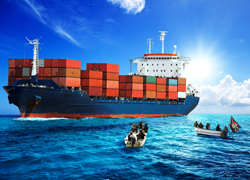
The surge of piracy attacks worldwide and their increasing threat to international shipping are indeed alarming. The Piracy Reporting Center of the International Maritime Bureau (IMB), an independent arm of the International Chamber of Commerce, reports that incidents of piracy and robbery at sea reached 445 in 2010, compared with 400 in 2009, while there were 293 attacks in 2008, and 263 and 239 for the years 2007 and 2006, respectively. In the first five months of 2011 there have been 273 such incidents — almost 50 percent more than in 2010. 92 percent of all hijackings in 2010 were off the coast of Somalia.
The global economic cost of maritime piracy is estimated at between $7-12 billion per year, according to a December 2010 report by the One Earth Future Foundation. The report found that the ransoms paid to Somali pirates had increased from an average of $150,000 in 2005 to $5.4 million in 2010. Pirates have killed several hostages when ransoms were not paid.
The international community has responded to this growing threat of piracy, especially in the Gulf of Aden and off the Somali coast, by undertaking naval operations, coordinated by NATO, the EU, and a coalition led by the United States, in addition to several countries operating on their own. It has been suggested to arm crew members, but this has not won favor from the shipping companies; perhaps it is more feasible to use private security companies, as is being done in some cases. Notwithstanding all these efforts, the scourge of piracy continues to be a major challenge to the international community. The major reason is that Somalia is a failed state, it has Africa’s longest coastline, spanning 3,025 miles, and its geographical location lies next to key shipping routes connecting the Red Sea and Indian Ocean.
Piracy constitutes a violation of international law, a crime that is considered a threat to all nations navigating the open seas. In an 1820 US Supreme Court case, US v. Smith, Justice Story, writing for the Court, declared that “there is scarcely a writer on the law of nations who does not allude to piracy as a crime of a settled and determinate nature.” Consequently the principle of universal jurisdiction applies to acts of piracy. Under this principle, any nation may prosecute acts of piracy in its domestic court, no matter where these acts occurred and no matter who the perpetrator is. Accordingly, a nation could rely on this principle to seize and prosecute Somali pirates engaged in piracy on the high seas. However, most countries have routinely released the pirates after capturing them because of the problems associated with trying them in their own national courts — expense, lack of adequate evidence, and the feared claim of asylum on the pirates’ part.
Some national courts have begun prosecuting pirates. Kenya has entered into several agreements with the European Union, the United States, the United Kingdom, China, and several other countries, to take custody of and prosecute pirates in its courts. Seychelles has also been prosecuting suspected pirates in its national court. Also, in late November 2010, the Virginia Federal District Court convicted five Somali pirates on federal piracy charges. Some European courts, too, have considered trying Somali pirates. Among these courts, the Dutch have taken the lead.
In addition to customary international law, two treaties are pertinent, under which a state could arrest and prosecute pirates in their national courts. The conventions are the United Nations Law of the Sea Convention (UNCLOS) and the United Nations Convention for the Suppression of Unlawful Acts against the Safety of Maritime Navigation (SUA). UNCLOS calls upon all states to combat piracy by cooperating to the fullest extent in repressing this crime on the high seas or any other place outside the jurisdiction of any state, although only warships, military ships, or other crafts of government service are permitted to seize them.
The 1992 SUA currently has 150 state parties and is aimed at addressing concerns about violence and terrorism on the high seas. Although it does not expressly outlaw piracy, an offense under SUA is committed if a person willingly takes part in seizing control of a ship by force or intimidation, uses violence against an individual on a ship affecting the safety of a ship, or damages a ship in such a way that it affects the ship’s safe navigation. Attempts at these piratical actions, aiding or abetting a pirate, or threatening to commit piratical acts are also included. The SUA Convention provides for extradition of offenders to ensure that a criminal is prosecuted even though the state in whose territory the offender is located is unwilling or unable to prosecute. In addition, the International Tribunal for the Law of the Sea may also provide a remedy as a forum for a piracy trial.
The United Nations Security Council, acting under Chapter VII, has adopted several resolutions since 2008 to counter piracy and armed robbery at sea. It has authorized member states to take action against pirates even in Somalia’s territorial waters and has called upon states and regional organizations to deploy naval vessels, arms and military aircraft and seize and dispose of vessels and equipment used in the commission of these crimes. It has also called on states to criminalize piracy under their domestic laws, and to favorably consider prosecuting and imprisoning suspected pirates.
There is currently no possibility of a Somali court sitting in Somalia or in the territory of another regional state applying Somali law. Could a regional tribunal or an international tribunal established by the Security Council under Chapter VII of the UN Charter be feasible? The challenges of creating such an international judicial body are enormous, but it is worthwhile seriously considering this possibility.
—
Ved Nanda is the John Evans Distinguished University Professor, University of Denver; Thompson G. Marsh Professor of Law and Director, International Legal Studies Program, University of Denver Sturm College of Law


